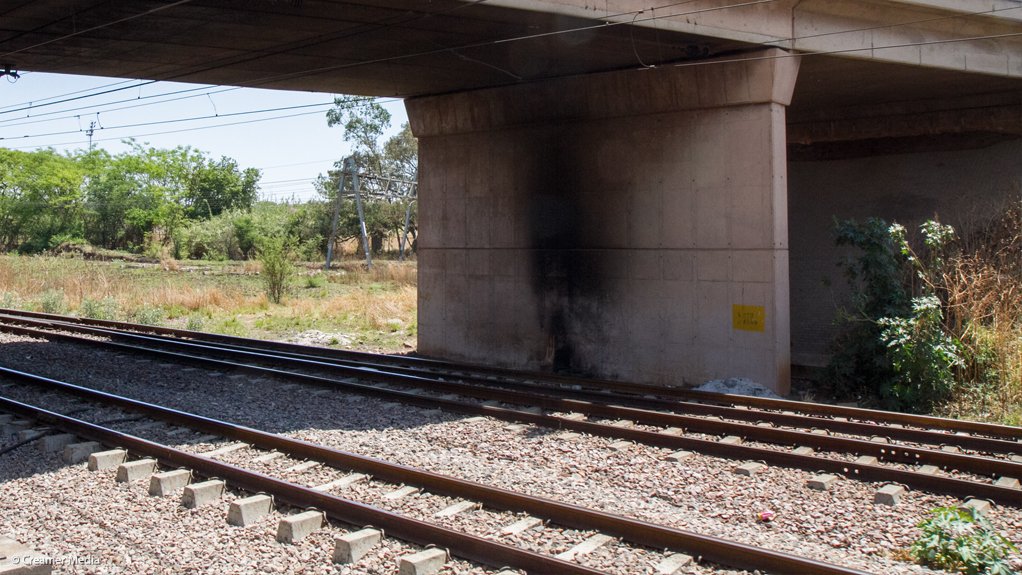South Africa’s rail network fell victim to a total of 4 703 separate “security-related incidents”, which largely comprised acts of vandalism and theft, in the 2013/14 financial period – denoting a 14% jump in the number of similar occurrences in the prior year, the Railway Safety Regulator (RSR) said on Monday.
Announcing the findings of its yearly ‘State of Safety’ report, in Johannesburg, the regulator reported that the bulk of the incidents occurred in Gauteng, KwaZulu-Natal and the Western Cape, adversely affecting the operations of the Passenger Rail Agency of South Africa and freight carrier Transnet Freight Rail.
Sixty-five per cent of these incidents were categorised as the theft of assets, while 22% were vandalism or malicious damage to property, 6% were related to personal safety on trains, 5% to personal safety at stations and 1% to personal safety outside the platform area, such as in yards and sidings.
The theft and vandalism of electrical and signal cables led to “significant” service disruptions, the disabling of critical train control subsystems and increased cost of railway operations, read the report.
A total of ten fatalities and 379 injuries were recorded in the 2013/14 period as a result of these incidents, exposing a 42% jump in security-related deaths and a 205% increase in security-related injuries.
“The [increase in security-related incidents] may be owing to the open nature of the rail network, which is easily available to criminal elements. Increasing urbanisation and the consequent encroachment on rail corridors is also a contributing factor,” RSR CEO Nkululeko Poya elaborated.
Compiled in accordance with the RSR’s mandate, the report provided an assessment of railway operators between April 1, 2013, and March 31, 2014, and aimed to identify primary areas of concern relating to safety, thus serving as an input to the development of strategic interventions.
The data further outlined 4 587 “operational occurrences” over the period – a 7% year-on-year increase in the combined number of collisions during the movement of rolling stock; derailments; people struck by trains; “people-related” incidents, such as incidents occurring between the train and the platform; and fires.
These incidents led to 456 fatalities and 1 498 injuries.
“Although these injuries and fatalities cannot be condoned, the South African data on fatalities and injuries appear to be aligned with international trends,” Poya noted.
He added that the hazardous interface between the rail network, roads and communities continued to pose a safety risk.
“A significant problem here is when man meets machine. We have to deal with this interface, as increasing urbanisation is putting more pressure on the passenger rail system and the safe coexistence of communities and railway reserves.
“We can’t tell people to stay away from rail corridors, because there are few land pockets available for movement and settlement, so we need to innovate, engage with communities and municipalities and educate people on rail-related safety,” said an impassioned Poya.
Elaborating on RSR-driven safety-related interventions, he added that the regulator had instituted operator safety compliance audits and had issued 36 operators with penalties for noncompliance.
It also conducted several awareness campaigns during the period to educate communities located adjacent to the “porous” rail network.
Poya emphasised, however, that a collaborative approach would be critical to reducing security and operations-related incidents.
“Going forward, we’ll look at issues identified in this report and encourage operators to develop and implement an effective safety management system. Operators shouldn’t only view this strategy as a compliance issue, but should be more innovative and collaborate with us – let’s discuss, let’s disagree, but let’s ensure full compliance to the system.
“I look forward to the day that we can present this report and see a decline in all areas, rather than the existing situation, where we see improvements in some areas, but potential disasters in others,” he concluded.
EMAIL THIS ARTICLE SAVE THIS ARTICLE
To subscribe email subscriptions@creamermedia.co.za or click here
To advertise email advertising@creamermedia.co.za or click here











